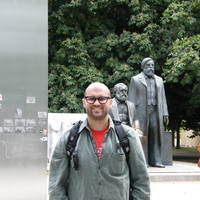
Paula Tufis
Address: Department of Sociology and Social Work,
University of Bucharest
Str. Schitu Magureanu 9,
Sector 5, Bucharest
University of Bucharest
Str. Schitu Magureanu 9,
Sector 5, Bucharest
less
Related Authors
Samuel Perry
University of Oklahoma
Seth Abrutyn
University of British Columbia
Duane Alwin
Pennsylvania State University
Bogdan Voicu
Romanian Academy of Science
Brian Starks
Weber State University
InterestsView All (11)








Uploads
Papers by Paula Tufis
gender, schooling level, occupational class, birth year, race/ethnicity, region, party identification, religious affiliation, and religiosity. Socioeconomic factors continue to be among the most important, but contrary to many arguments, occupational class, as measured by Weeden–Grusky micro-classes, has a relatively less important role in predicting child-rearing values, once education is taken into account. Religious variables are also important, less so than socioeconomic factors, but there is support for the hypothesis of the growing strength over time in the impact of religious conservatism and participation.
Keywords: status attainment, Central and Eastern Europe, socialist stratification and inequality, post-communist stratification and inequality.
school characteristics, community characteristics, and children’s school success in Romania, in 2001. The analysis is placed in the context of the debates regarding the relative importance of family
background factors, school factors and neighborhood/ community factors in explaining the variation in children’s academic achievement. While research disentangling these relationships is abundant for developed countries and for several developing countries in Latin America, sub-Saharan Africa, and South
and East Asia, the Central and Eastern European countries are
underrepresented in this type of research. The empirical analysis on educational inequality in Romania undertaken here will also be placed in the context of the educational reforms that accompanied the fall of communism in 1989. The literature review will draw mainly on the contributions to the field based on the American context and some earlier contributions regarding the context of developing countries. It will also present the opinions of several scholars
examining the context of educational reforms after the fall of communism in Central and Eastern Europe and in Romania, in particular. The present work will draw on these theoretical bases and the results of an empirical analysis on Romanian fourth graders in an attempt to sketch an image of several factors that contribute to inequalities among children in school success, in Romania.
gender, schooling level, occupational class, birth year, race/ethnicity, region, party identification, religious affiliation, and religiosity. Socioeconomic factors continue to be among the most important, but contrary to many arguments, occupational class, as measured by Weeden–Grusky micro-classes, has a relatively less important role in predicting child-rearing values, once education is taken into account. Religious variables are also important, less so than socioeconomic factors, but there is support for the hypothesis of the growing strength over time in the impact of religious conservatism and participation.
Keywords: status attainment, Central and Eastern Europe, socialist stratification and inequality, post-communist stratification and inequality.
school characteristics, community characteristics, and children’s school success in Romania, in 2001. The analysis is placed in the context of the debates regarding the relative importance of family
background factors, school factors and neighborhood/ community factors in explaining the variation in children’s academic achievement. While research disentangling these relationships is abundant for developed countries and for several developing countries in Latin America, sub-Saharan Africa, and South
and East Asia, the Central and Eastern European countries are
underrepresented in this type of research. The empirical analysis on educational inequality in Romania undertaken here will also be placed in the context of the educational reforms that accompanied the fall of communism in 1989. The literature review will draw mainly on the contributions to the field based on the American context and some earlier contributions regarding the context of developing countries. It will also present the opinions of several scholars
examining the context of educational reforms after the fall of communism in Central and Eastern Europe and in Romania, in particular. The present work will draw on these theoretical bases and the results of an empirical analysis on Romanian fourth graders in an attempt to sketch an image of several factors that contribute to inequalities among children in school success, in Romania.